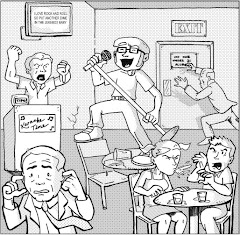The Fist of God #4, January 1989, Eternity Comics
writer: R.A. Jones
artist: Butch Burcham
letterer: Debbie Burcham
cover colorist: Bruce Timm
The Fist of God #4 evokes two past contributions to A Comic A Day, the first and most notable of which is the inclusion of two little letters on its front cover: "B.T." Yes, long-time readers may recall, back in January, I reviewed First Comics' Whisper #30, which I purchased simply because those familiar initials led me to believe that Bruce Timm may have played a more significant role in the production of that issue. Of course, he didn't, and like this issue, he simply colored the cover . . . but, hey, any Timm work pre-Batman: The Animated Series is worth discovering if only for its nostalgic value. (I'm still rummaging through my childhood keepsakes for those Masters of the Universe mini-comics he drew . . . Incidentally, I picked up Justice League Unlimited season two at Target for an affordable twenty bucks this weekend, and his interview of the series' inspirations with Mark Hamill is down right charming. But I digress.) As I've said before, you can really appreciate where someone is once you know where they've come from.
The second element of this issue that reminded me of ACAD's past is its starring character, Mick Taggert, an unapologetic tough guy. We analyzed the tough guy with Cobb #2, and while I'd rather not repeat myself, Taggert's story does offer a different aspect of the phenomenon: the hypocrisy of the tough guy. In the series synopsis on this final issue's inside front cover, Taggert is described as a "professional fighter -- until he killed a man." The implication to this statement is a modicum of personal guilt, a feeling of remorse that withstands the law but retains the solemn integrity of Taggert himself. Either way, dubbed the Fist of God, this issue finds Mick in Persia, where a false magician tricks a village into believing that their 200-year-dead king has risen from the grave. This magician has Taggert's girlfriend (who is also his brother's wife, but we're getting to that) hostage, so the observant Fist notices when the mystic switches the mummified king's body with a stand-in; the thin veil of smoke and mirrors is just enough to convince the desperate populace. Still, they watch with stunned immobility when Mick swings in, saves the girl, and beheads the fraud. Alas, though he saves her, he doesn't keep her; Taggert bravely remains behind when his brother's plane is too heavy to lift off. Truly, he's a tough guy to the end, when a caption reveals that letting her go is the "hardest battle he's ever fought."
Where's the hypocrisy, you ask? Well, admittedly, I don't know the entire story here, but assuming my presumption about Mick's origins are correct, and he regrets the initial murder that made him a fugitive, why would he so willingly and easily kill again? Even if the concept isn't true in this context, oftentimes the tough guy laments an accidental death when conversely he is too eager to act as judge, jury, and executioner toward his own enemies. While such wanton violence is an accepted staple in pulp fiction like The Fist of God, I'm merely confused by the ambiguity of morality on the part of our supposed hero. In the end, Taggert's capture betrays a touch of tragedy, as if the good guy should get to ride into the sunset, but if this guy's truly a hero, why shouldn't he boldly face the consequences of his actions, however just? Unfortunately, social justice isn't always the equivalent to the letter of the law. Perhaps the toughest part about being a tough guy is the tough decisions they have to make.
In this issue's letters column, writer R.A. Jones highlights a negative review of The Fist of God, and while I find its analysis to be a bit too critical, I did appreciate its observation of the unnecessary narration of nearly every scene -- heck, nearly every panel. The bold sequence in which Mick swings in to save the girl via a chandelier's rope (yes, like right out of an old movie) is neutered by the literal lingual play by play in each panel. The action clearly spoke for itself and the captions just took up space. In fact, the lofty narration struck me as indicative of a writer that couldn't let his creation go, that needed some fingerprint in every aspect of the storytelling process . . . like a mother with empty nest syndrome. Sometimes, the kid needs to learn those lessons on his own, or, in this case, sometimes the artists can cut their storytelling chops on a few silent panels, if you let them. Is Taggert the Fist of God so much as Jones is holding on to this work white-knuckled or what?
Generally, The Fist of God #4 was an enjoyable issue with shades of Indiana Jones adventure. While I was reminded of previously reviewed comics through this issue's logistics, the story stood on its own as entertaining, and further Burcham's art was very well developed in many scenes, evoking similarities to the classic Marvel masters like Romita, Sr. or Buscema. I'd recommend it, but I'd also warn potential readers to remember the big picture. When God makes a fist, you better believe it'll pack a wallop.
Sunday, March 25, 2007
Subscribe to:
Post Comments (Atom)



No comments:
Post a Comment